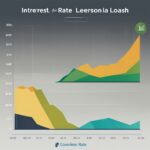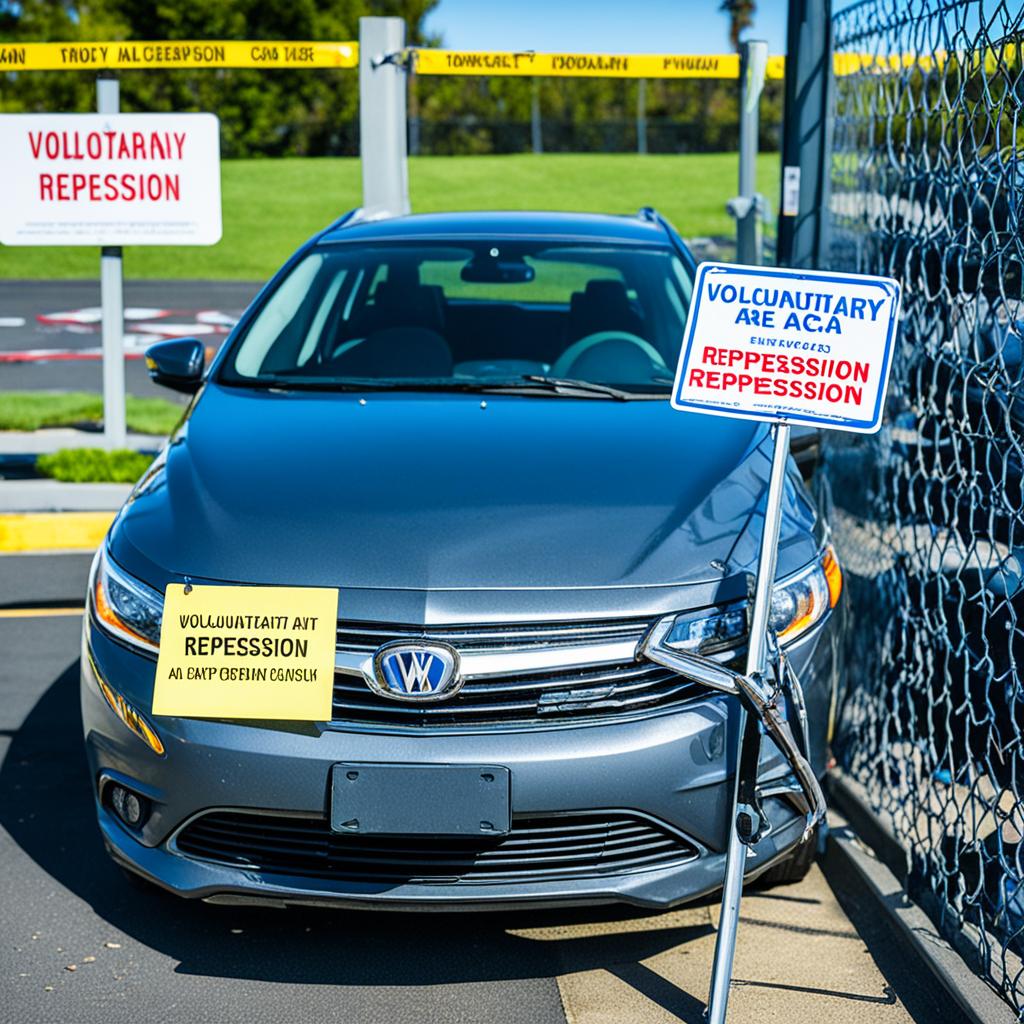Hi there! If you’re facing financial difficulties and can no longer afford your car payments, voluntary repossession may be an option worth considering. In this article, I will provide you with key information about voluntary repossession, how it works, its consequences, and the impact it can have on your credit.
Voluntary repossession is the act of returning your car to the lender when you can no longer meet the terms of your loan agreement. It is an alternative to involuntary repossession, where the lender takes action to seize the vehicle after the loan is in default. By taking the initiative to return the car voluntarily, you have more control over the process.
However, before deciding to surrender your car, it’s important to be aware of the potential consequences. Voluntary repossession does not absolve you of financial obligations. The remaining loan balance may still need to be paid, along with any fees or charges. Furthermore, voluntary repossession can have a negative impact on your credit, making it harder to secure future loans or obtain favorable interest rates.
Throughout this article, we’ll explore the car repossession process, the implications of voluntary surrendering a car loan, and the alternatives you should consider before opting for voluntary repossession. It’s essential to make an informed decision that aligns with your financial goals and circumstances.
Key Takeaways:
- Voluntary repossession is the act of returning your car to the lender when you can no longer meet the loan agreement terms.
- It is important to understand the potential consequences of voluntary repossession, including the remaining loan balance and its impact on your credit.
- Consider alternatives such as contacting your lender, refinancing your loan, or selling the car before opting for voluntary repossession.
- Seeking legal advice, particularly from a bankruptcy attorney, can provide valuable insights tailored to your specific situation.
- Make well-informed decisions by thoroughly researching your options and understanding the implications.
What is voluntary repossession?
Voluntary repossession, also known as voluntary surrender, refers to the act of returning your car to the lender when you can no longer meet the terms of your car loan agreement. It is an alternative to repossession, where the lender takes action to seize the vehicle after the loan is in default. By choosing voluntary repossession, you take the initiative to return the car instead of waiting for the lender to take it forcefully.
Voluntary repossession allows borrowers to proactively address their financial difficulties by returning the vehicle to the lender.
How does voluntary repossession work?
To initiate a voluntary repossession, you need to inform the lender that you can no longer make payments and want to surrender the vehicle voluntarily. You’ll then need to arrange a time and location to return the car and hand over the keys. It’s important to note the date, location, and contact information of the person you left the vehicle with. This information may be useful in the future if the lender has any questions.
If you decide to proceed with voluntary repossession, here are the steps you need to follow:
- Contact your lender: Reach out to your lender and explain your financial situation. Inform them that you can no longer make payments and want to surrender the vehicle voluntarily. It’s important to communicate openly and honestly, as this can help establish a smoother process.
- Arrange a time and location: Coordinate with the lender to determine when and where you will return the car. This ensures that both parties are aware of the handover details and can plan accordingly.
- Hand over the keys: When you return the vehicle, make sure to hand over all sets of keys to the lender or their representative. This signifies the transfer of ownership and responsibility back to the lender.
- Document the process: Take note of the date, location, and contact information of the person you left the vehicle with. This documentation can serve as evidence and clarification if any questions or disputes arise later on.
Example:
“I contacted my lender and explained my financial difficulties. They understood my situation and guided me through the process of voluntary repossession. We agreed on a convenient time and location for me to return the car and hand over the keys. I made sure to note down the details and the contact information of the person I gave the vehicle to. This way, I had a record of the transaction and could provide it if needed.”
By following these steps and maintaining open communication with your lender, you can navigate the voluntary repossession process more smoothly. Remember, it’s important to act responsibly and fulfill your obligations to the best of your ability, even in challenging financial circumstances.
How a voluntary repossession affects your finances
When considering a voluntary repossession, it’s important to understand its impact on your finances. While returning the vehicle may seem like a solution to your financial struggles, it doesn’t absolve you of all obligations.
If you choose voluntary repossession, the lender may try to sell the vehicle to recoup the remaining loan balance. However, if there’s still an outstanding balance after the sale, you’ll still be responsible for paying it.
In addition to the balance of the loan, there may be fees and charges associated with the repossession process. It’s crucial to be aware of these potential costs, as they can add to your financial burden.
Failure to pay the remaining balance or any associated fees may result in further consequences. The lender could turn your account over to a collection agency, potentially leading to harassing calls and increased stress. In some cases, the lender may even take legal action against you to recover the outstanding debt.
Another significant consequence of voluntary repossession is its impact on your credit. The repossession will be listed on your credit reports, indicating your inability to fulfill your financial obligations. This negative mark can stay on your credit reports for up to seven years, making it difficult to obtain future loans or credit on favorable terms.
The Importance of Credit Reports and Credit History
It’s important to understand the significance of credit reports and credit history. Lenders, employers, and even landlords often use this information to assess your financial responsibility and reliability. A voluntary repossession can significantly impact your credit score, making it harder for you to secure loans, rent a property, or obtain favorable interest rates in the future.
Note: I highly recommend checking your credit reports regularly and addressing any inconsistencies or errors. Staying informed about your credit history empowers you to take the necessary steps towards improving your financial situation.
It’s essential to carefully evaluate the financial implications of voluntary repossession before making a decision. Exploring alternatives, such as contacting your lender to discuss options or selling the vehicle to pay off the loan, may offer more favorable outcomes for your financial well-being.
Remember, seeking professional advice, such as consulting with a bankruptcy attorney or financial advisor, can provide valuable insights tailored to your specific situation. They can help you make informed decisions and navigate the complexities of your financial challenges.
Further Steps to Protect Your Finances
Along with exploring alternatives and seeking professional advice, it’s important to evaluate your income and expenses. Creating a realistic budget can help you regain financial control and avoid similar challenges in the future.
Consider implementing strategies to improve your credit. This may include making timely payments on existing debts, exploring secured credit options, and ensuring that your credit reports accurately reflect your financial status.
Remember, rebuilding your credit and recovering from a voluntary repossession may take time. It requires consistent effort, financial responsibility, and a commitment to positive financial habits.
In the next section, we will explore the alternatives to voluntary repossession and their potential implications for your financial health.
Alternatives to voluntary repossession
Before deciding on voluntary repossession, it’s important to consider alternatives. There are several options you can explore to address your financial difficulties and avoid the negative consequences of repossession. Here are some alternatives to voluntary repossession:
Contact your lender
If you’re struggling to make your car payments, it’s a good idea to contact your lender as soon as possible. Explain your financial situation to them and see if they are willing to work with you. Some lenders may be open to changing the loan terms, such as extending the repayment period or lowering the interest rate, to make the payments more affordable for you.
Refinance your car loan
Another alternative to voluntary repossession is to refinance your car loan. Refinancing involves taking out a new loan to pay off your existing car loan. By refinancing, you may be able to secure a lower interest rate or extend the repayment period, which can help reduce your monthly payments and make them more manageable.
Sell your car
If your car is worth more than the remaining loan balance, selling it can be a viable option. By selling the car, you can use the proceeds to pay off the loan and potentially find a more affordable vehicle or alternative transportation. However, it’s important to carefully consider the market value of your car and ensure that selling it will cover the remaining loan balance.
Create a budget and seek affordable payments
Taking a closer look at your budget and expenses can also help you find ways to make your car payments more affordable. Consider cutting back on non-essential expenses and reallocating funds towards your car loan payments. Additionally, you can try to negotiate with your lender for more affordable payment arrangements based on your current financial situation.
Comparison of alternatives to voluntary repossession
| Alternatives | Pros | Cons |
|---|---|---|
| Contact your lender | – Potential for loan term modification – Maintains relationship with lender – May avoid repossession |
– Not guaranteed approval – Loan modification may not be sufficient |
| Refinance your car loan | – Lower interest rate – Extended repayment period – Potentially lower monthly payments |
– Credit check and approval required – Refinancing fees may apply |
| Sell your car | – Pay off remaining loan balance – Find a more affordable vehicle – Avoid repossession |
– Car value vs. loan balance consideration – Need alternative transportation |
| Create a budget and seek affordable payments | – Take control of finances – Potentially reduce expenses – Maintain ownership of the car |
– May require lifestyle adjustments – Limited impact on loan terms |
By considering these alternatives, you can explore options that may help you overcome your financial difficulties without resorting to voluntary repossession. Remember, each situation is unique, so it’s important to carefully assess your circumstances and choose the option that aligns best with your financial goals and needs.
The impact of voluntary repossession on credit
Voluntary repossession can have a significant impact on your credit. When you choose to surrender your vehicle voluntarily, it will be recorded as a derogatory mark on your credit reports for up to seven years. This notation, commonly referred to as a “voluntary surrender,” indicates to future lenders that you were unable to fulfill your loan obligations.
Although credit bureaus like Experian use the term “voluntary surrender” instead of “repossession,” the negative consequences remain the same. This derogatory mark can make it more challenging to secure new loans and may result in higher interest rates being offered to account for the perceived risk of default.
| Voluntary Repossession | Credit Impact |
|---|---|
| Recorded as a derogatory mark on credit reports | Stay on credit reports for up to seven years |
| May be listed as “voluntary surrender” by credit bureaus | Future lenders may view it negatively |
| Can make it harder to secure new loans | Higher interest rates may be offered due to perceived risk |
The potential consequences of voluntary repossession
When considering voluntary repossession of your vehicle, it’s essential to understand the potential consequences involved. While it may seem like a viable solution to financial difficulties, there are several factors to consider that could have lasting impacts on your financial situation.
One of the most significant consequences of voluntary repossession is the potential for financial repercussions. If you’re unable to pay the remaining balance on your loan after the sale of the vehicle, the lender may send your account to collections. This can result in constant harassing calls from debt collectors and the stress of dealing with collection efforts.
Table: Potential Consequences of Voluntary Repossession
| Consequences | Description |
|---|---|
| Account Collections | If you are unable to pay the remaining balance after the vehicle sale, your account may be turned over to collections agencies, leading to continuous contact attempts and potential legal actions. |
| Legal Action | The lender may choose to take legal action against you if you default on the loan after voluntary repossession, further complicating your financial situation. |
| Credit Score Impact | Voluntary repossession can significantly damage your credit score, making it harder to secure future loans or obtain favorable interest rates. |
| Loan Approval Challenges | The negative effects of voluntary repossession on your credit may cause difficulties in obtaining loan approvals in the future. |
| Higher Interest Rates | Lenders may charge higher interest rates to borrowers with a history of voluntary repossession due to the perceived risk of default. |
Image:

Additionally, the negative impact on your credit score cannot be understated. Voluntary repossession will be reported on your credit reports for up to seven years, making it more challenging to qualify for future loans or credit cards. Even if you are approved for credit, the consequences of voluntary repossession may result in higher interest rates, further exacerbating your financial burden.
It’s crucial to weigh the potential consequences before deciding on voluntary repossession. Exploring alternatives such as negotiating with your lender, refinancing your loan, or considering other means of addressing your financial challenges can help mitigate the negative impacts on your credit and financial wellbeing.
Benefits and drawbacks of voluntary repossession
When considering voluntary repossession, it’s important to weigh the benefits and drawbacks associated with this decision. While it offers certain advantages, there are also potential downsides to be aware of. Let’s take a closer look at both sides:
Benefits of Voluntary Repossession
- Proactive Approach: By choosing voluntary repossession, you take control of the situation and make a proactive decision to address your inability to make loan payments. This proactive approach can help you avoid the stress and uncertainty of involuntary repossession.
- Negotiate with Creditor: Voluntary repossession may provide an opportunity to negotiate with your creditor. You can try to reach a settlement or agreement that eases your financial burden, such as a payment plan or reduced outstanding balance. It’s worth exploring this option to potentially find some relief.
- Avoid Surprise Repossession: Returning the vehicle voluntarily allows you to avoid the surprise and potential distress of waking up to find your car has been repossessed. With voluntary repossession, you have the chance to prepare and handle the return of the vehicle on your terms.
- Prepare for Return: When you choose voluntary repossession, you have the opportunity to prepare for the return of the vehicle. You can remove personal belongings and ensure the car is in good condition, minimizing any potential dispute or additional charges.
- Emotional Impact: For some borrowers, voluntary repossession can provide a sense of closure and relieve emotional stress associated with struggling to make payments. It can be a proactive step towards resolving financial difficulties and moving forward.
- Cost-Saving Potential: Depending on your specific situation, voluntary repossession might save you some money. By avoiding costs related to involuntary repossession, such as towing fees and storage charges, you could potentially reduce the overall financial impact of the repossession process.
Drawbacks of Voluntary Repossession
- Debt Not Erased: Voluntary repossession doesn’t absolve you of your loan obligations. If there is still a remaining balance on the loan after the vehicle is sold, you’ll still be responsible for paying off the debt. This means you may still need to find a way to settle or manage the remaining financial burden.
- Impact on Future Loans: Voluntary repossession can have a negative impact on your ability to secure future loans. Lenders may consider it a sign of financial instability and be hesitant to approve new loans or offer favorable interest rates. It’s important to be aware of this potential consequence when considering voluntary repossession.
- Credit Score Impact: Like involuntary repossession, voluntary repossession can have a negative impact on your credit score. It will be listed on your credit reports, potentially resulting in a decrease in your credit score. This, in turn, can make it more challenging to obtain credit in the future or may lead to higher interest rates on loans.
Considering the potential benefits and drawbacks of voluntary repossession is essential before making a decision. It’s important to weigh your options, consider alternative solutions, and consult with a financial advisor or attorney who can provide personalized guidance based on your specific circumstances.
Other options to consider before voluntary repossession
Voluntary repossession is a challenging decision, and it’s important to explore other alternatives before taking that step. One viable option to consider is bankruptcy, specifically Chapter 7 and Chapter 13.
Chapter 7 Bankruptcy: Discharge Your Debt
In Chapter 7 bankruptcy, you have the opportunity to discharge your car loan along with other unsecured debts. By filing for Chapter 7, you can potentially wipe out your remaining debt and gain financial relief.
Chapter 13 Bankruptcy: Renegotiate Loan Terms
If you choose Chapter 13 bankruptcy, it may allow you to renegotiate the terms of your car loan. Through this process, you can potentially reduce the interest rate, extend the payment period, and make your monthly payments more manageable. Chapter 13 bankruptcy provides a structured repayment plan tailored to your financial situation.
These bankruptcy alternatives give you the opportunity to alleviate your financial burden without resorting to voluntary repossession. However, it’s important to consult with a bankruptcy attorney to understand the eligibility criteria and legal requirements for filing bankruptcy.
Seeking legal advice
If you’re considering voluntary repossession or exploring alternatives like bankruptcy, it’s advisable to seek legal advice. Making important financial decisions without the proper guidance can have long-lasting consequences. Consulting with a knowledgeable bankruptcy attorney will ensure that you have a clear understanding of your options and can make informed choices tailored to your unique circumstances.
When it comes to finding an attorney, you have several options. You can start by asking for referrals from trusted sources such as friends, family, or colleagues who have previously gone through similar situations. Their firsthand experience can provide valuable insight into the quality of legal representation they received.
Another effective method is to search online directories that specialize in connecting individuals with bankruptcy attorneys. These directories often provide helpful information such as attorney profiles, experience, and client reviews. Take the time to read these profiles and reviews to get a sense of each attorney’s expertise and success rate in repossession cases.
After narrowing down your choices, schedule consultations with the attorneys on your shortlist. During these consultations, you’ll have the opportunity to discuss your case in detail and assess the attorney’s expertise in the field. Pay attention to their communication style and how comfortable you feel discussing personal financial matters with them.
It’s essential to inquire about the attorney’s fees and payment structure during the consultation. Understanding the cost of legal representation will help you evaluate whether it aligns with your budget and financial situation. Some attorneys may offer a free initial consultation, while others may charge a nominal fee for their time.
Remember, finding the right attorney is crucial. You want someone who not only has experience in handling repossession cases but also someone who is compassionate, responsive, and can effectively communicate complex legal concepts to you. By seeking legal advice, you can navigate the intricacies of voluntary repossession or bankruptcy with confidence and make well-informed choices that protect your interests.
Important factors to consider when choosing a repossession attorney
When facing the challenging situation of repossession, it’s crucial to have the right legal representation by your side. Choosing a repossession attorney who understands the intricacies of the process and has the expertise to protect your rights is essential. Here are some important factors to consider in your search:
1. Recommendations and Online Directories
Start by seeking recommendations from trusted sources who may have had similar experiences. Additionally, online directories can help you find attorneys specializing in repossession cases.
2. Attorney Websites and Biographies
Visit the websites of prospective attorneys to gain insights into their background and expertise. Read their biographies to understand their experience and specialization in repossession cases.
3. Experience and Success Rate
Review the attorney’s experience and success rate in handling repossession cases. This information can give you confidence in their ability to navigate the legal complexities and secure desirable outcomes.
4. Fees and Payment Terms
Understanding the attorney’s fee structure and payment terms upfront is crucial. Clarify how they bill for their services and what expenses are included. This transparency will help you avoid any misunderstandings down the line.
5. Consultations
Schedule consultations with potential attorneys to discuss your case in detail. Use this opportunity to ask relevant questions and evaluate their expertise, communication style, and comfort level. A good attorney-client fit is essential for a successful partnership.
Remember, choosing a repossession attorney is an important decision that can greatly impact the outcome of your case. Take your time, conduct thorough research, and select an attorney who has both the experience and the passion to advocate for your rights.
By considering these important factors, you can make an informed decision and choose a repossession attorney who will skillfully guide you through the legal process, ensuring your interests are protected every step of the way.

Pros and cons of different attorney fees structures
When seeking legal representation, it’s important to be aware that different attorneys may have varying fee structures. Understanding these fee structures upfront will help you make informed decisions and avoid any surprises when it comes to paying for legal services. Let’s explore the pros and cons of three common attorney fee structures: hourly rate, contingency basis, and flat fees.
1. Hourly Rate
Some attorneys charge an hourly rate for their services. This means that you will be billed for the time they spend working on your case. The hourly rate can vary based on factors such as the attorney’s experience and specialization. Here are the pros and cons:
- Pros: Hourly rate billing provides transparency as you are charged for the actual time spent on your case. It allows for flexibility if your legal matter is expected to require varying amounts of time.
- Cons: Hourly rates can accumulate quickly, especially for complex cases or those that require extensive research and preparation. It can be challenging to estimate the final cost, making it important to regularly communicate with your attorney about the billing.
2. Contingency Basis
Some attorneys work on a contingency basis, particularly in cases where there is a potential for financial recovery. In this fee structure, the attorney’s payment is contingent upon winning the case or securing a settlement. Here are the pros and cons:
- Pros: A contingency agreement allows individuals who may not have the financial means to afford upfront legal fees to pursue their case. You do not pay attorney fees unless you win or reach a settlement, so there is no immediate financial burden.
- Cons: If your case is successful, the attorney’s fee will be a percentage of the recovery amount. This means that your final financial recovery may be reduced by the attorney’s fees. Additionally, not all types of cases are eligible for contingency fee arrangements.
3. Flat Fees
Some attorneys offer flat fees for specific legal services. With this fee structure, the attorney charges a fixed amount for a particular service. Here are the pros and cons:
- Pros: Flat fees provide certainty as you know the exact cost of the legal service upfront. It can be particularly beneficial for routine or straightforward legal matters where the scope of work is well-defined.
- Cons: Flat fees may not cover additional expenses such as court filing fees or service charges. It’s important to clarify what is included in the flat fee and whether any additional costs may apply.
It’s crucial to clarify the attorney’s fees and payment terms when discussing your case. Understand how they bill for their services, including any additional expenses, so you can plan accordingly. Open communication about fees will help you establish a transparent and effective working relationship with your attorney.
The benefits of thorough attorney research
When facing the prospect of repossession, finding the right attorney to represent your interests is crucial. Conducting thorough research on potential attorneys can offer several benefits that can greatly impact the outcome of your case.
Experience and specialization: Researching attorneys allows you to evaluate their experience and specialization in repossession cases. Look for attorneys who have a proven track record in handling similar cases and have a deep understanding of the legal complexities involved.
Client reviews and success rate: Reading client reviews and testimonials provides valuable insights into an attorney’s professionalism and communication style. Positive reviews and a high success rate indicate that the attorney has a proven ability to achieve favorable outcomes for their clients.
“Conducting thorough research on potential attorneys can greatly increase your chances of finding an attorney who is best suited to handle your repossession case effectively, resulting in the best possible outcome.”
Professionalism and communication style: Communication is key in any legal case, and finding an attorney who communicates effectively and maintains professionalism throughout the process is essential. Look for an attorney who is responsive, attentive, and able to effectively communicate the progress of your case.
Investing time in researching attorneys allows you to compare and contrast their qualifications, experience, and success rates. By selecting an attorney who specializes in repossession cases and has a proven track record, you increase your chances of achieving the desired outcome in your repossession case.
Importance of seeking expert advice during financial challenges
Seeking expert advice during financial challenges, such as considering voluntary repossession, is crucial. Consulting a bankruptcy attorney can help you understand all your options and make well-informed decisions. An experienced attorney can guide you through the complex legal processes, explain the pros and cons, and help you choose the best path for your financial recovery. Remember, you don’t have to face these challenges alone – there are professionals ready to assist you.
| Financial Challenges | Benefits of Seeking Expert Advice |
|---|---|
| 1. Difficulty making car loan payments | 1. Understand all available options |
| 2. Fear of vehicle repossession | 2. Obtain guidance through legal processes |
| 3. Overwhelming debt and financial distress | 3. Make well-informed decisions |
| 4. Uncertainty about the impact on credit | 4. Receive personalized advice and support |
| 5. Lack of knowledge about available alternatives | 5. Maximize chances for financial recovery |
When facing financial challenges that may lead to voluntary repossession, seeking expert advice is paramount. A bankruptcy attorney possesses the knowledge and experience to assist you in navigating the complexities of your financial situation. They can provide guidance on available alternatives, explain the legal implications of voluntary repossession, and help you make decisions that align with your long-term financial goals.
You may be wondering, “Why do I need an attorney?” The answer lies in their specialization in bankruptcy and repossession cases. They have a deep understanding of the laws, regulations, and requirements that affect your situation. By enlisting their expertise, you gain access to in-depth knowledge and dependable guidance throughout the process.
Furthermore, a bankruptcy attorney can help you explore alternatives to voluntary repossession, such as renegotiating loan terms or filing for bankruptcy, if it is in your best interest. They will work closely with you to assess your unique circumstances and devise a strategy that maximizes your chances for financial recovery.
The emotional impact of facing financial challenges can be overwhelming. Having a reputable attorney by your side provides a sense of security and reassurance. Their professionalism and empathetic approach will help alleviate some of the stress and anxiety associated with your situation.
Remember, seeking expert advice is not a sign of weakness but rather a strategic step toward regaining control of your finances. It’s an investment in your future and well-being.
Conclusion
Voluntary repossession is a significant decision that can have long-lasting financial and credit consequences. It is important to thoroughly explore alternatives before choosing this option. Consider contacting your lender to discuss alternative solutions such as refinancing the loan or selling the car.
Seeking legal advice, especially from a bankruptcy attorney, can provide valuable insights into your specific situation and help you make well-informed decisions. An attorney can guide you through the complex processes, explain the potential impact on your credit, and assist you in choosing the best path forward.
Remember, making well-informed decisions is crucial. Take the time to carefully evaluate all options available to you, considering your unique financial goals and circumstances. By doing so, you can minimize the impact on your credit and make choices that align with your long-term financial well-being.
FAQ
What is voluntary repossession?
How does voluntary repossession work?
How does voluntary repossession affect your finances?
What are the alternatives to voluntary repossession?
How does voluntary repossession impact your credit?
What are the potential consequences of voluntary repossession?
What are the benefits and drawbacks of voluntary repossession?
What are the other options to consider before voluntary repossession?
When should I seek legal advice?
What factors should I consider when choosing a repossession attorney?
What are the pros and cons of different attorney fee structures?
What are the benefits of thorough attorney research?
Why is seeking expert advice during a financial challenge important?
Source Links
- https://www.debtstoppers.com/blog/voluntary-repossession-pros-and-cons/
- https://www.creditkarma.com/auto/i/voluntary-repossession
- https://ncdoj.gov/protecting-consumers/automobiles/car-repossession/
Money posts:
 Secured Loan with a Financed Car: How-To Guide (2024)
Secured Loan with a Financed Car: How-To Guide (2024)
 Personal Loan Offers: Finding The Best Deal (2024)
Personal Loan Offers: Finding The Best Deal (2024)
 California Debt Relief: Legit Help or Scam? (2024)
California Debt Relief: Legit Help or Scam? (2024)
 Low Interest Personal Loans: Find the Best Rates (2024)
Low Interest Personal Loans: Find the Best Rates (2024)
 Apply for Car Loan: Easy Steps to Your Dream Car (2024)
Apply for Car Loan: Easy Steps to Your Dream Car (2024)
 Emergency Same Day Loans: A Lifesaver or Trap? (2024)
Emergency Same Day Loans: A Lifesaver or Trap? (2024)
 Car Title Loans Online: Fast Cash or Fast Trouble? (2024)
Car Title Loans Online: Fast Cash or Fast Trouble? (2024)
 PDS Debt: Solutions for Debt Relief (2024)
PDS Debt: Solutions for Debt Relief (2024)

